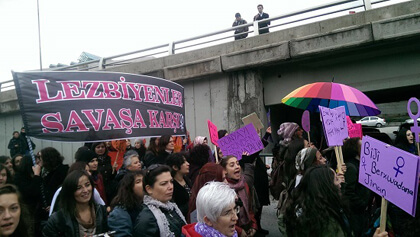Two feral cats face off on the streets of Istanbul in Ceyda Torun’s “Kedi.” | OSCILLOSCOPE LABORATORIES
“Kedi” purports to be a documentary about the feral cats that roam around Istanbul, many of them taken care of by people who haven’t fully adopted them as pets. I suppose it’s not surprising that in the end, it says more about the needs of humans than cats.
Alas, “Kedi” makes a lot of facile assumptions about the personality of felines and humans. It’s far more ambitious than the 80-minute LOLcat video one might expect from its premise, but possibly less entertaining.
Director Ceyda Torun and her cinematographer did a very good job of following her feline subjects through Istanbul, using a variety of camera angles, a very mobile camera, and even night-vision to depict one cat stalking mice. Kira Fontana’s vibraphone-driven score aims for the propulsive quality of minimalist composer Steve Reich and succeeds in capturing it. “Kedi” is certainly well-crafted.
Ceyda Torun’s cats too often described in human terms, but what about the reverse?
The trailer and press kit for “Kedi” give the individual cats profiled in the film human personality traits, describing them as “the gentleman,” “the ladies’ man,” “the hustler,” etc. This says more about our perceptions of these cats than their actual personalities. Who knows why a cat would refrain from entering an upscale restaurant but instead tap on its window to let the staff know he’s hungry and wants his dinner? The way people tend to perceive animal behavior as equivalent to human needs and wants is commentary on our species not cats.
Torun clearly doesn’t think about things that way. A young dreadlocked hipster she interviews sees cats as a model for elegant femininity, but at least she’s using her imagination. More prosaically, another woman Torun talked to says, “Animals behave the same way as people.” If she had made a film about stray dogs rather than cats, there would undoubtedly be lots of talk about the importance of people leading packs.
“Kedi” succeeds only when it focuses on people rather than cats. One man says he was able to bring himself out of a nervous breakdown, which drugs couldn’t treat, by taking care of a group of cats. There’s a lot of talk about the destruction of certain quarters of Istanbul, a city whose population has ballooned to 20 million. Implicitly, Torun parallels the human victims of gentrification to the more unfortunate feral cats.
The cats profiled by Torun seem to have a pretty good life. They have no shortage of people willing to feed them and even offer them temporary housing. The film runs the risk of romanticizing feral cats. While it mentions the fights some of them get into, it never mentions the dangers they’re subjected to: starvation (for those unlucky enough not to catch enough mice or to have attached themselves to a person), disease, and overpopulation (spaying and neutering are barely mentioned in the film.) Istanbul is portrayed as a uniquely benign city for them to dwell in, which it may truly be. The press kit compares the treatment of cats there to that of cows in India, influenced by positive anecdotes about the animals in Islamic tradition.
The concept of cat cafés –– a space where one can drink coffee and spend an hour petting cats –– started out in Japan and has spread around the world, including Brooklyn. If something about the notion of cats offering themselves to be petted by anyone recalls a brothel, at least some of the cafés are operated with the idea of hooking the animals up with potential adopters. “Kedi” is a virtual cat café, but the actual cafés don’t burden themselves with its lofty notions about human/ animal bonding. The film is cute, but nowhere near as profound as it thinks it is.
KEDI | Directed by Ceyda Torun | Oscilloscope Laboratories | In Turkish with English subtitles | Opens Feb. 10 | Metrograph, 7 Ludlow St., btwn. Canal & Hester Sts. | metrograph.com

































